Business Law Report: Analysis of Agency and Fiduciary Duty Issues
VerifiedAdded on 2019/11/08
|8
|1576
|278
Report
AI Summary
This report analyzes two key legal issues in business law: agency and fiduciary duty. The first question examines the liability of Gabba Pty Ltd for a contract entered into by its agent, Ricardo, exceeding the authorized amount. The analysis focuses on the principles of actual and ostensible authority, and ratification. The second question explores whether Jeremy, an estate agent, breached his fiduciary duty by attempting to profit from his position, thereby prioritizing his personal interests over those of his principal, Aspirational Developments Pty Ltd. The report references relevant case law and legal principles to support its conclusions. It highlights the importance of agents acting within their authority and upholding their fiduciary duties to avoid legal repercussions.

Running head: BUSINESS LAW
Business Law
Name of the Student
Name of the University
Author Note
Business Law
Name of the Student
Name of the University
Author Note
Paraphrase This Document
Need a fresh take? Get an instant paraphrase of this document with our AI Paraphraser
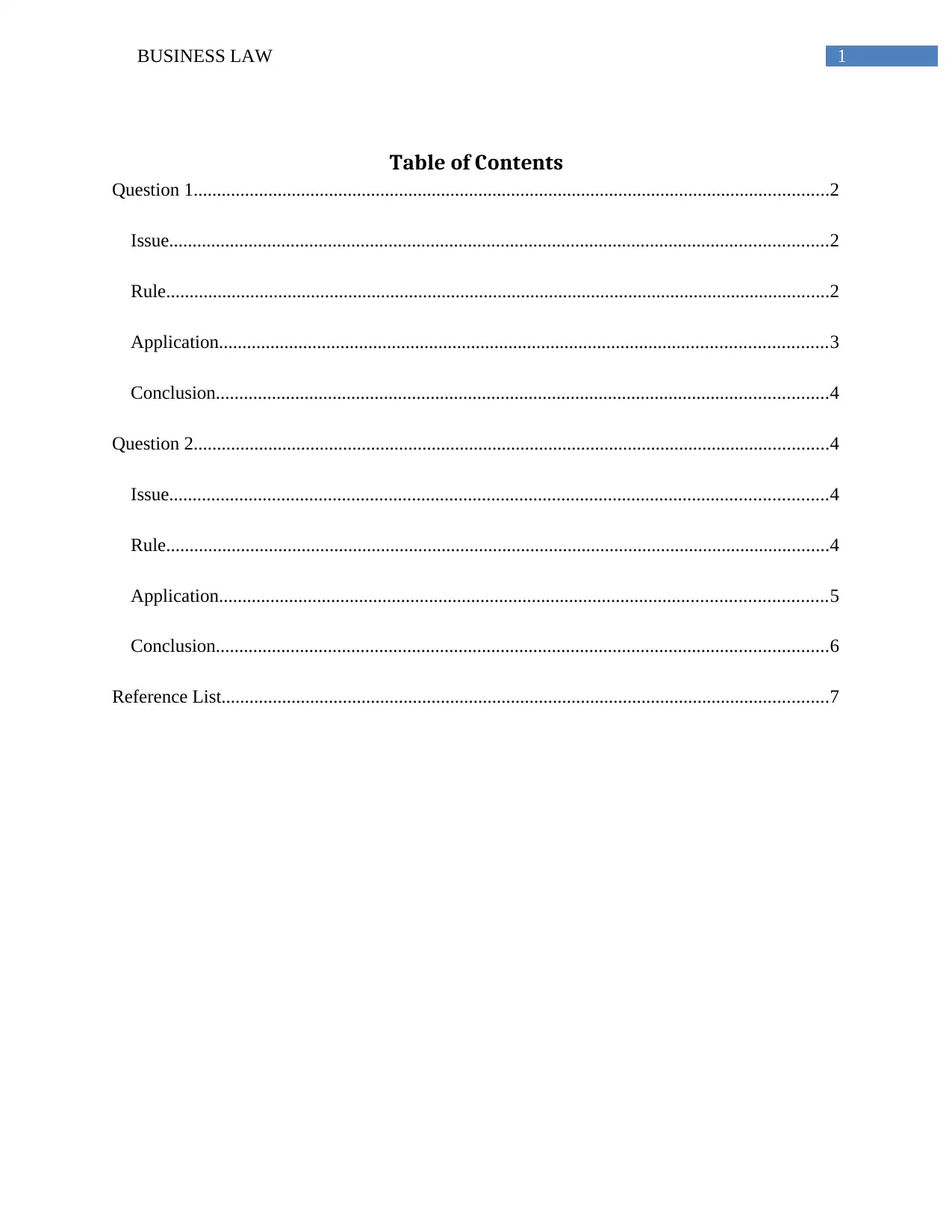
1BUSINESS LAW
Table of Contents
Question 1........................................................................................................................................2
Issue.............................................................................................................................................2
Rule..............................................................................................................................................2
Application..................................................................................................................................3
Conclusion...................................................................................................................................4
Question 2........................................................................................................................................4
Issue.............................................................................................................................................4
Rule..............................................................................................................................................4
Application..................................................................................................................................5
Conclusion...................................................................................................................................6
Reference List..................................................................................................................................7
Table of Contents
Question 1........................................................................................................................................2
Issue.............................................................................................................................................2
Rule..............................................................................................................................................2
Application..................................................................................................................................3
Conclusion...................................................................................................................................4
Question 2........................................................................................................................................4
Issue.............................................................................................................................................4
Rule..............................................................................................................................................4
Application..................................................................................................................................5
Conclusion...................................................................................................................................6
Reference List..................................................................................................................................7
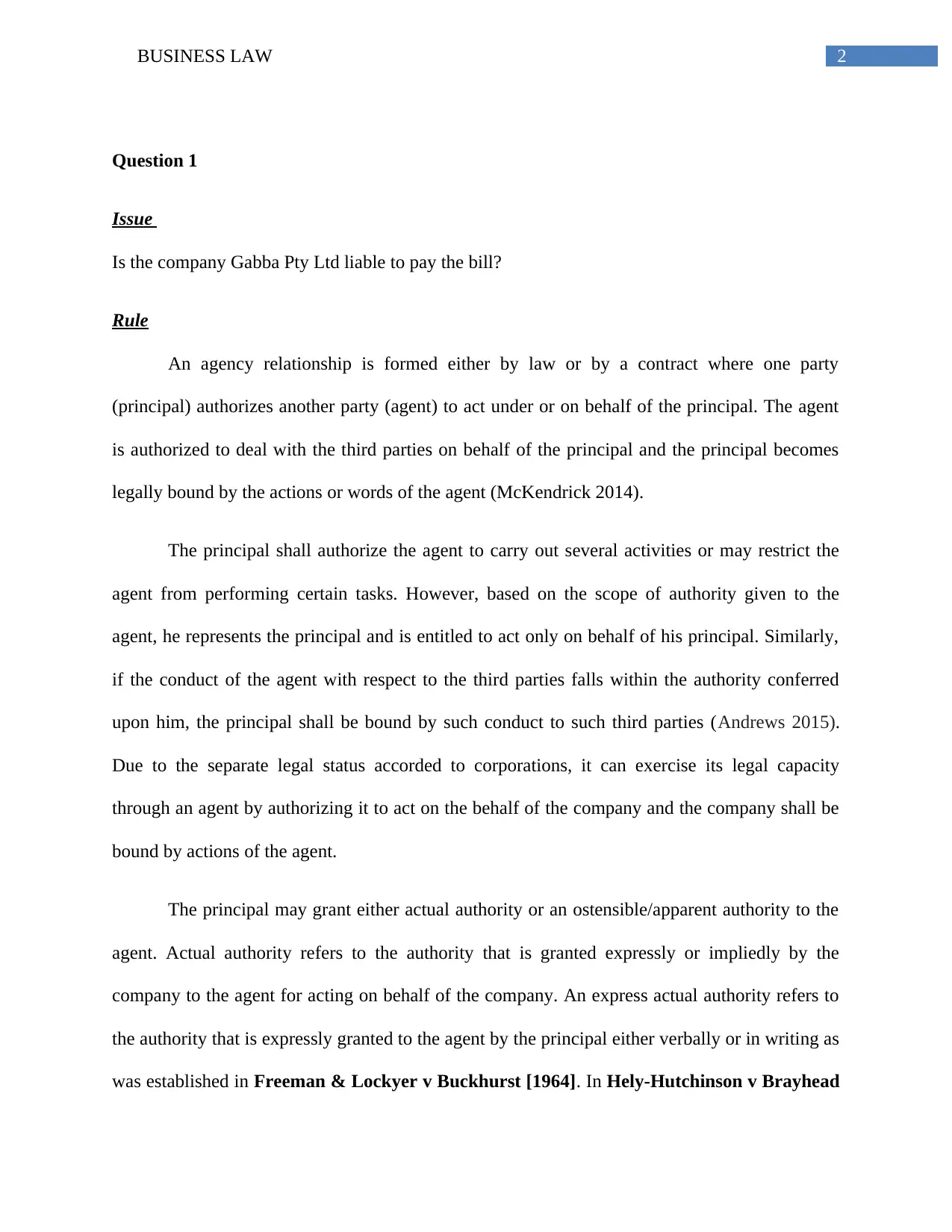
2BUSINESS LAW
Question 1
Issue
Is the company Gabba Pty Ltd liable to pay the bill?
Rule
An agency relationship is formed either by law or by a contract where one party
(principal) authorizes another party (agent) to act under or on behalf of the principal. The agent
is authorized to deal with the third parties on behalf of the principal and the principal becomes
legally bound by the actions or words of the agent (McKendrick 2014).
The principal shall authorize the agent to carry out several activities or may restrict the
agent from performing certain tasks. However, based on the scope of authority given to the
agent, he represents the principal and is entitled to act only on behalf of his principal. Similarly,
if the conduct of the agent with respect to the third parties falls within the authority conferred
upon him, the principal shall be bound by such conduct to such third parties (Andrews 2015).
Due to the separate legal status accorded to corporations, it can exercise its legal capacity
through an agent by authorizing it to act on the behalf of the company and the company shall be
bound by actions of the agent.
The principal may grant either actual authority or an ostensible/apparent authority to the
agent. Actual authority refers to the authority that is granted expressly or impliedly by the
company to the agent for acting on behalf of the company. An express actual authority refers to
the authority that is expressly granted to the agent by the principal either verbally or in writing as
was established in Freeman & Lockyer v Buckhurst [1964]. In Hely-Hutchinson v Brayhead
Question 1
Issue
Is the company Gabba Pty Ltd liable to pay the bill?
Rule
An agency relationship is formed either by law or by a contract where one party
(principal) authorizes another party (agent) to act under or on behalf of the principal. The agent
is authorized to deal with the third parties on behalf of the principal and the principal becomes
legally bound by the actions or words of the agent (McKendrick 2014).
The principal shall authorize the agent to carry out several activities or may restrict the
agent from performing certain tasks. However, based on the scope of authority given to the
agent, he represents the principal and is entitled to act only on behalf of his principal. Similarly,
if the conduct of the agent with respect to the third parties falls within the authority conferred
upon him, the principal shall be bound by such conduct to such third parties (Andrews 2015).
Due to the separate legal status accorded to corporations, it can exercise its legal capacity
through an agent by authorizing it to act on the behalf of the company and the company shall be
bound by actions of the agent.
The principal may grant either actual authority or an ostensible/apparent authority to the
agent. Actual authority refers to the authority that is granted expressly or impliedly by the
company to the agent for acting on behalf of the company. An express actual authority refers to
the authority that is expressly granted to the agent by the principal either verbally or in writing as
was established in Freeman & Lockyer v Buckhurst [1964]. In Hely-Hutchinson v Brayhead
⊘ This is a preview!⊘
Do you want full access?
Subscribe today to unlock all pages.

Trusted by 1+ million students worldwide
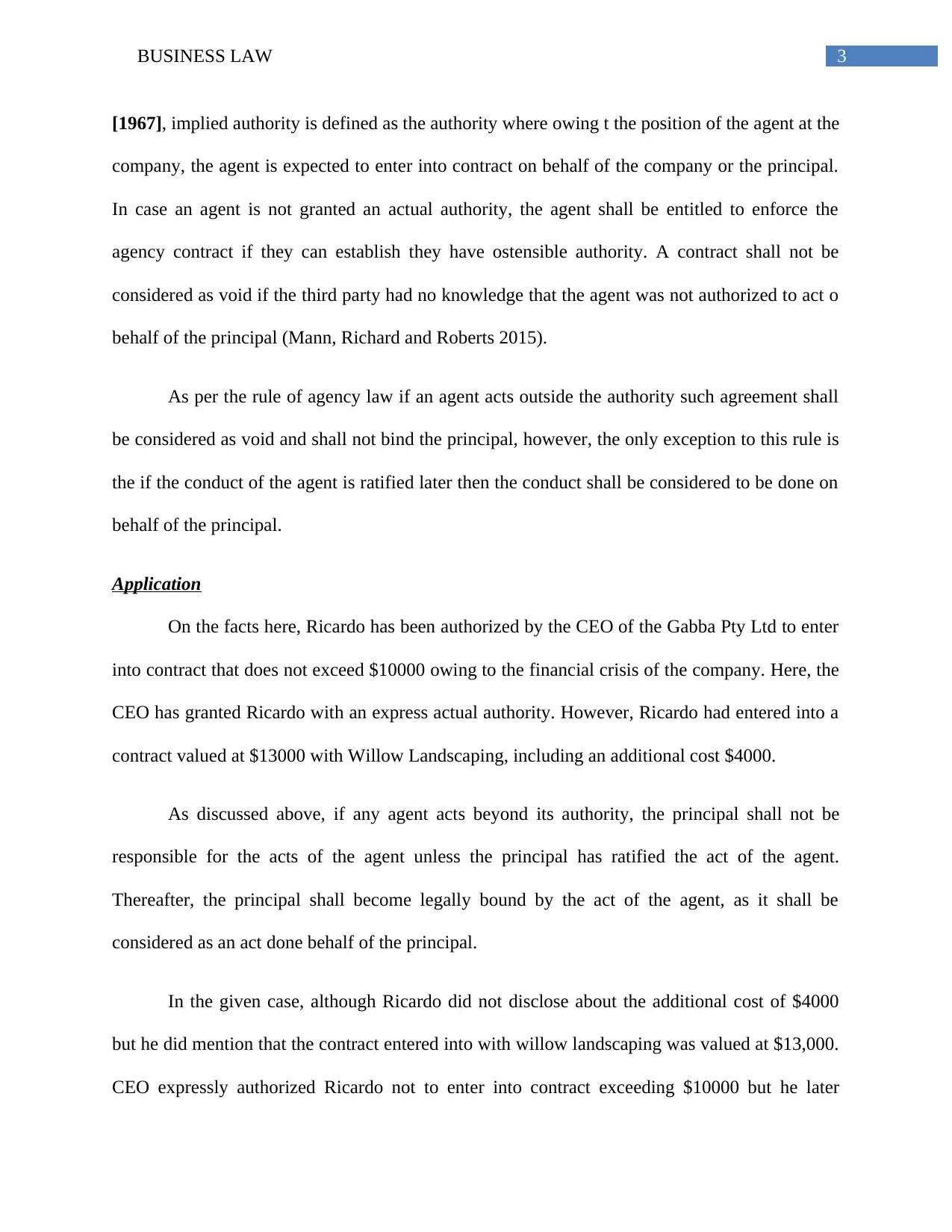
3BUSINESS LAW
[1967], implied authority is defined as the authority where owing t the position of the agent at the
company, the agent is expected to enter into contract on behalf of the company or the principal.
In case an agent is not granted an actual authority, the agent shall be entitled to enforce the
agency contract if they can establish they have ostensible authority. A contract shall not be
considered as void if the third party had no knowledge that the agent was not authorized to act o
behalf of the principal (Mann, Richard and Roberts 2015).
As per the rule of agency law if an agent acts outside the authority such agreement shall
be considered as void and shall not bind the principal, however, the only exception to this rule is
the if the conduct of the agent is ratified later then the conduct shall be considered to be done on
behalf of the principal.
Application
On the facts here, Ricardo has been authorized by the CEO of the Gabba Pty Ltd to enter
into contract that does not exceed $10000 owing to the financial crisis of the company. Here, the
CEO has granted Ricardo with an express actual authority. However, Ricardo had entered into a
contract valued at $13000 with Willow Landscaping, including an additional cost $4000.
As discussed above, if any agent acts beyond its authority, the principal shall not be
responsible for the acts of the agent unless the principal has ratified the act of the agent.
Thereafter, the principal shall become legally bound by the act of the agent, as it shall be
considered as an act done behalf of the principal.
In the given case, although Ricardo did not disclose about the additional cost of $4000
but he did mention that the contract entered into with willow landscaping was valued at $13,000.
CEO expressly authorized Ricardo not to enter into contract exceeding $10000 but he later
[1967], implied authority is defined as the authority where owing t the position of the agent at the
company, the agent is expected to enter into contract on behalf of the company or the principal.
In case an agent is not granted an actual authority, the agent shall be entitled to enforce the
agency contract if they can establish they have ostensible authority. A contract shall not be
considered as void if the third party had no knowledge that the agent was not authorized to act o
behalf of the principal (Mann, Richard and Roberts 2015).
As per the rule of agency law if an agent acts outside the authority such agreement shall
be considered as void and shall not bind the principal, however, the only exception to this rule is
the if the conduct of the agent is ratified later then the conduct shall be considered to be done on
behalf of the principal.
Application
On the facts here, Ricardo has been authorized by the CEO of the Gabba Pty Ltd to enter
into contract that does not exceed $10000 owing to the financial crisis of the company. Here, the
CEO has granted Ricardo with an express actual authority. However, Ricardo had entered into a
contract valued at $13000 with Willow Landscaping, including an additional cost $4000.
As discussed above, if any agent acts beyond its authority, the principal shall not be
responsible for the acts of the agent unless the principal has ratified the act of the agent.
Thereafter, the principal shall become legally bound by the act of the agent, as it shall be
considered as an act done behalf of the principal.
In the given case, although Ricardo did not disclose about the additional cost of $4000
but he did mention that the contract entered into with willow landscaping was valued at $13,000.
CEO expressly authorized Ricardo not to enter into contract exceeding $10000 but he later
Paraphrase This Document
Need a fresh take? Get an instant paraphrase of this document with our AI Paraphraser
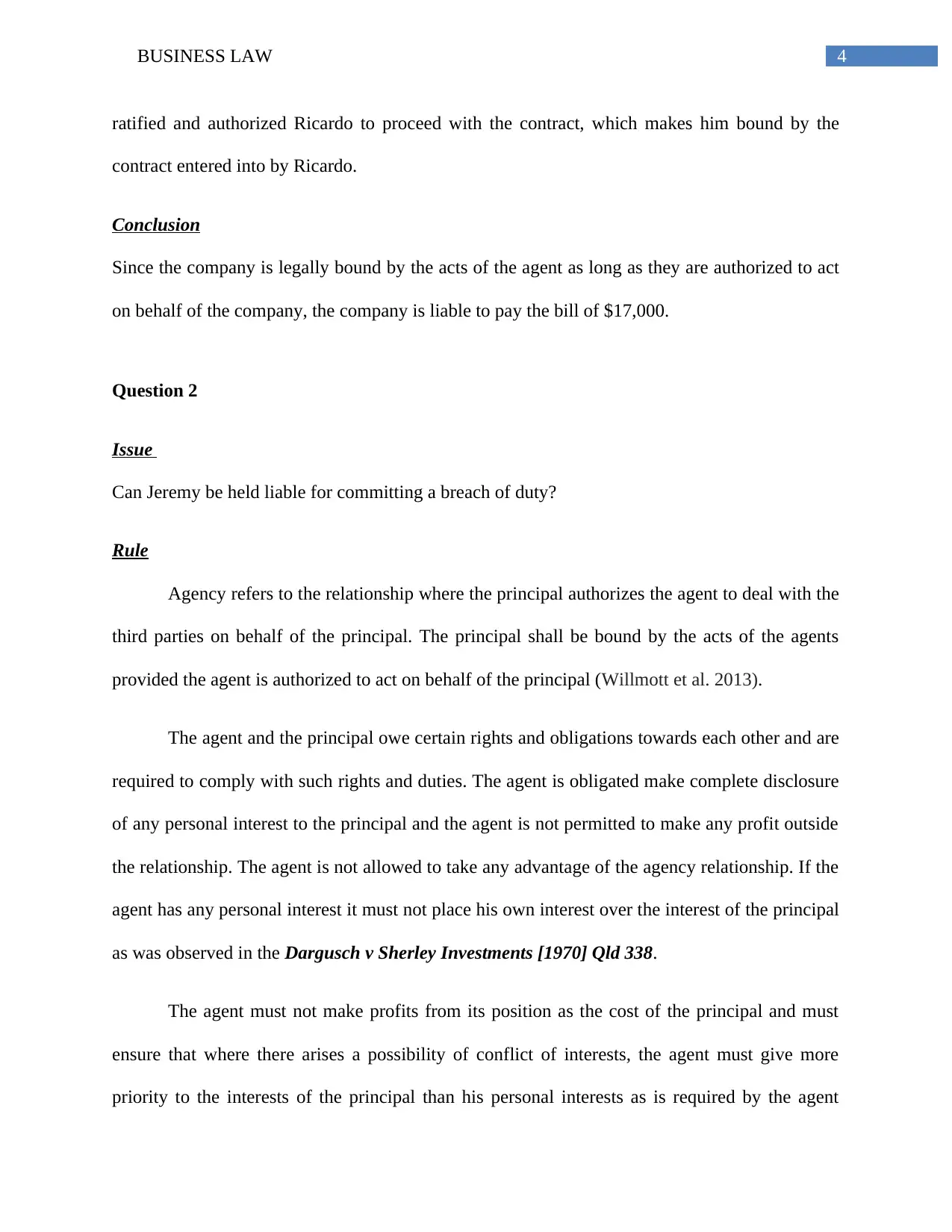
4BUSINESS LAW
ratified and authorized Ricardo to proceed with the contract, which makes him bound by the
contract entered into by Ricardo.
Conclusion
Since the company is legally bound by the acts of the agent as long as they are authorized to act
on behalf of the company, the company is liable to pay the bill of $17,000.
Question 2
Issue
Can Jeremy be held liable for committing a breach of duty?
Rule
Agency refers to the relationship where the principal authorizes the agent to deal with the
third parties on behalf of the principal. The principal shall be bound by the acts of the agents
provided the agent is authorized to act on behalf of the principal (Willmott et al. 2013).
The agent and the principal owe certain rights and obligations towards each other and are
required to comply with such rights and duties. The agent is obligated make complete disclosure
of any personal interest to the principal and the agent is not permitted to make any profit outside
the relationship. The agent is not allowed to take any advantage of the agency relationship. If the
agent has any personal interest it must not place his own interest over the interest of the principal
as was observed in the Dargusch v Sherley Investments [1970] Qld 338.
The agent must not make profits from its position as the cost of the principal and must
ensure that where there arises a possibility of conflict of interests, the agent must give more
priority to the interests of the principal than his personal interests as is required by the agent
ratified and authorized Ricardo to proceed with the contract, which makes him bound by the
contract entered into by Ricardo.
Conclusion
Since the company is legally bound by the acts of the agent as long as they are authorized to act
on behalf of the company, the company is liable to pay the bill of $17,000.
Question 2
Issue
Can Jeremy be held liable for committing a breach of duty?
Rule
Agency refers to the relationship where the principal authorizes the agent to deal with the
third parties on behalf of the principal. The principal shall be bound by the acts of the agents
provided the agent is authorized to act on behalf of the principal (Willmott et al. 2013).
The agent and the principal owe certain rights and obligations towards each other and are
required to comply with such rights and duties. The agent is obligated make complete disclosure
of any personal interest to the principal and the agent is not permitted to make any profit outside
the relationship. The agent is not allowed to take any advantage of the agency relationship. If the
agent has any personal interest it must not place his own interest over the interest of the principal
as was observed in the Dargusch v Sherley Investments [1970] Qld 338.
The agent must not make profits from its position as the cost of the principal and must
ensure that where there arises a possibility of conflict of interests, the agent must give more
priority to the interests of the principal than his personal interests as is required by the agent
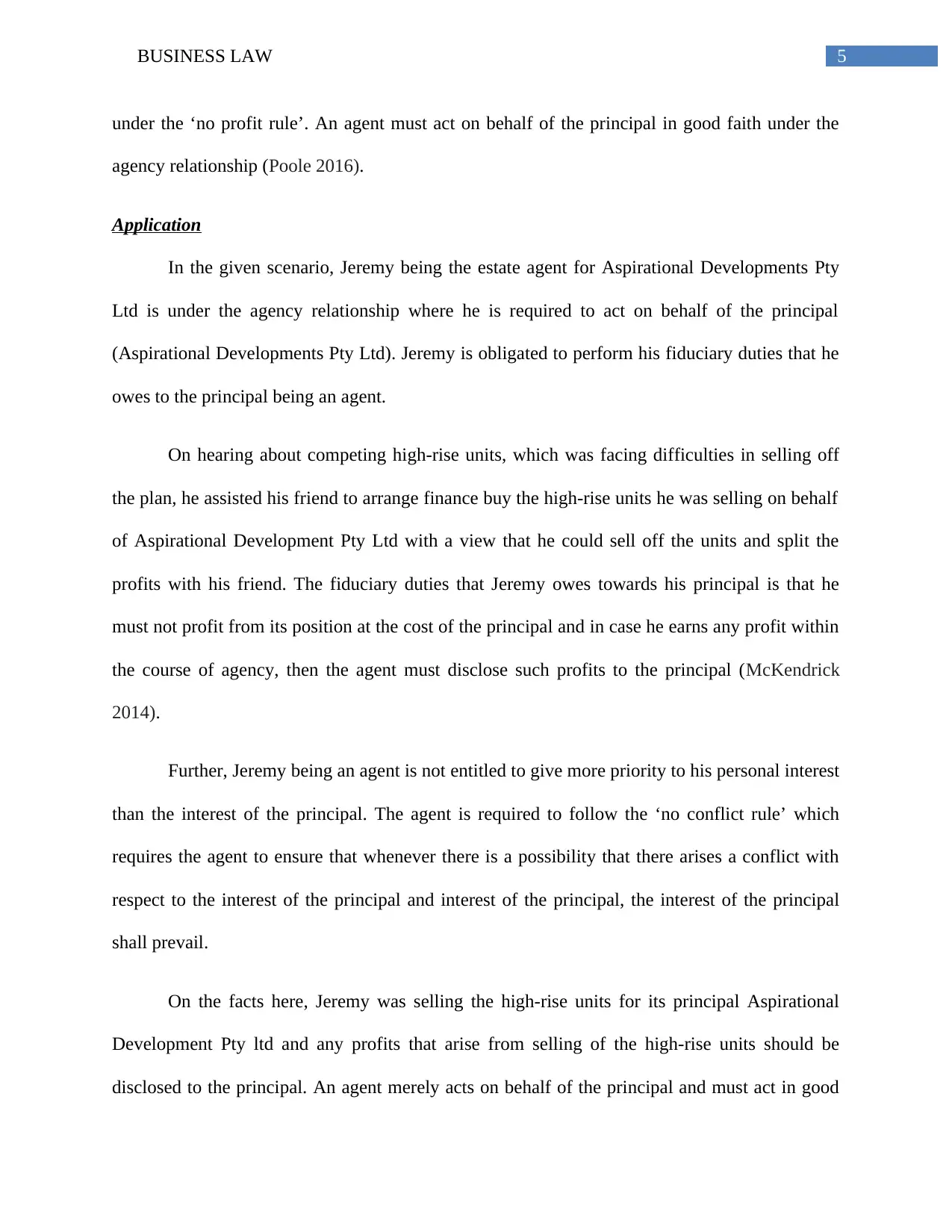
5BUSINESS LAW
under the ‘no profit rule’. An agent must act on behalf of the principal in good faith under the
agency relationship (Poole 2016).
Application
In the given scenario, Jeremy being the estate agent for Aspirational Developments Pty
Ltd is under the agency relationship where he is required to act on behalf of the principal
(Aspirational Developments Pty Ltd). Jeremy is obligated to perform his fiduciary duties that he
owes to the principal being an agent.
On hearing about competing high-rise units, which was facing difficulties in selling off
the plan, he assisted his friend to arrange finance buy the high-rise units he was selling on behalf
of Aspirational Development Pty Ltd with a view that he could sell off the units and split the
profits with his friend. The fiduciary duties that Jeremy owes towards his principal is that he
must not profit from its position at the cost of the principal and in case he earns any profit within
the course of agency, then the agent must disclose such profits to the principal (McKendrick
2014).
Further, Jeremy being an agent is not entitled to give more priority to his personal interest
than the interest of the principal. The agent is required to follow the ‘no conflict rule’ which
requires the agent to ensure that whenever there is a possibility that there arises a conflict with
respect to the interest of the principal and interest of the principal, the interest of the principal
shall prevail.
On the facts here, Jeremy was selling the high-rise units for its principal Aspirational
Development Pty ltd and any profits that arise from selling of the high-rise units should be
disclosed to the principal. An agent merely acts on behalf of the principal and must act in good
under the ‘no profit rule’. An agent must act on behalf of the principal in good faith under the
agency relationship (Poole 2016).
Application
In the given scenario, Jeremy being the estate agent for Aspirational Developments Pty
Ltd is under the agency relationship where he is required to act on behalf of the principal
(Aspirational Developments Pty Ltd). Jeremy is obligated to perform his fiduciary duties that he
owes to the principal being an agent.
On hearing about competing high-rise units, which was facing difficulties in selling off
the plan, he assisted his friend to arrange finance buy the high-rise units he was selling on behalf
of Aspirational Development Pty Ltd with a view that he could sell off the units and split the
profits with his friend. The fiduciary duties that Jeremy owes towards his principal is that he
must not profit from its position at the cost of the principal and in case he earns any profit within
the course of agency, then the agent must disclose such profits to the principal (McKendrick
2014).
Further, Jeremy being an agent is not entitled to give more priority to his personal interest
than the interest of the principal. The agent is required to follow the ‘no conflict rule’ which
requires the agent to ensure that whenever there is a possibility that there arises a conflict with
respect to the interest of the principal and interest of the principal, the interest of the principal
shall prevail.
On the facts here, Jeremy was selling the high-rise units for its principal Aspirational
Development Pty ltd and any profits that arise from selling of the high-rise units should be
disclosed to the principal. An agent merely acts on behalf of the principal and must act in good
⊘ This is a preview!⊘
Do you want full access?
Subscribe today to unlock all pages.

Trusted by 1+ million students worldwide
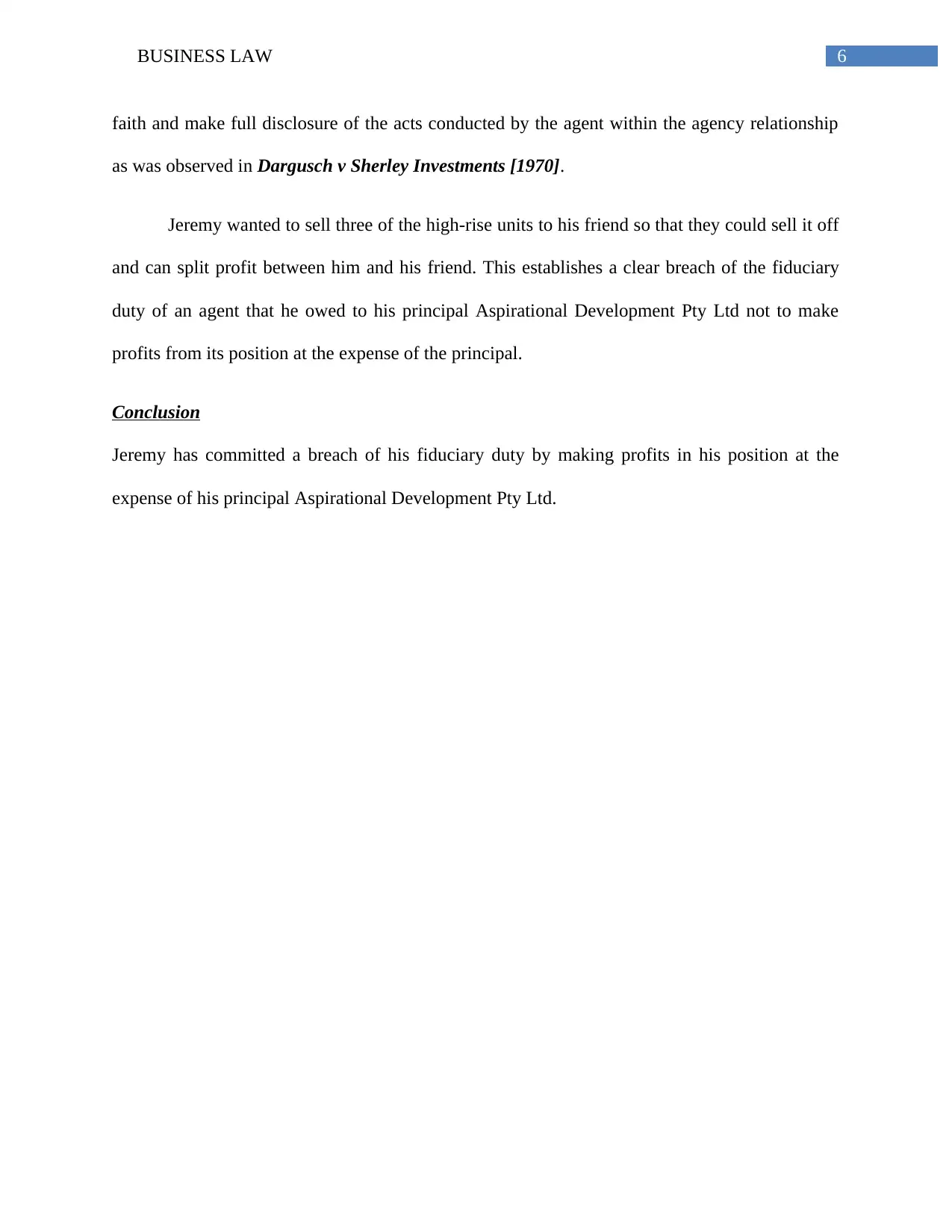
6BUSINESS LAW
faith and make full disclosure of the acts conducted by the agent within the agency relationship
as was observed in Dargusch v Sherley Investments [1970].
Jeremy wanted to sell three of the high-rise units to his friend so that they could sell it off
and can split profit between him and his friend. This establishes a clear breach of the fiduciary
duty of an agent that he owed to his principal Aspirational Development Pty Ltd not to make
profits from its position at the expense of the principal.
Conclusion
Jeremy has committed a breach of his fiduciary duty by making profits in his position at the
expense of his principal Aspirational Development Pty Ltd.
faith and make full disclosure of the acts conducted by the agent within the agency relationship
as was observed in Dargusch v Sherley Investments [1970].
Jeremy wanted to sell three of the high-rise units to his friend so that they could sell it off
and can split profit between him and his friend. This establishes a clear breach of the fiduciary
duty of an agent that he owed to his principal Aspirational Development Pty Ltd not to make
profits from its position at the expense of the principal.
Conclusion
Jeremy has committed a breach of his fiduciary duty by making profits in his position at the
expense of his principal Aspirational Development Pty Ltd.
Paraphrase This Document
Need a fresh take? Get an instant paraphrase of this document with our AI Paraphraser
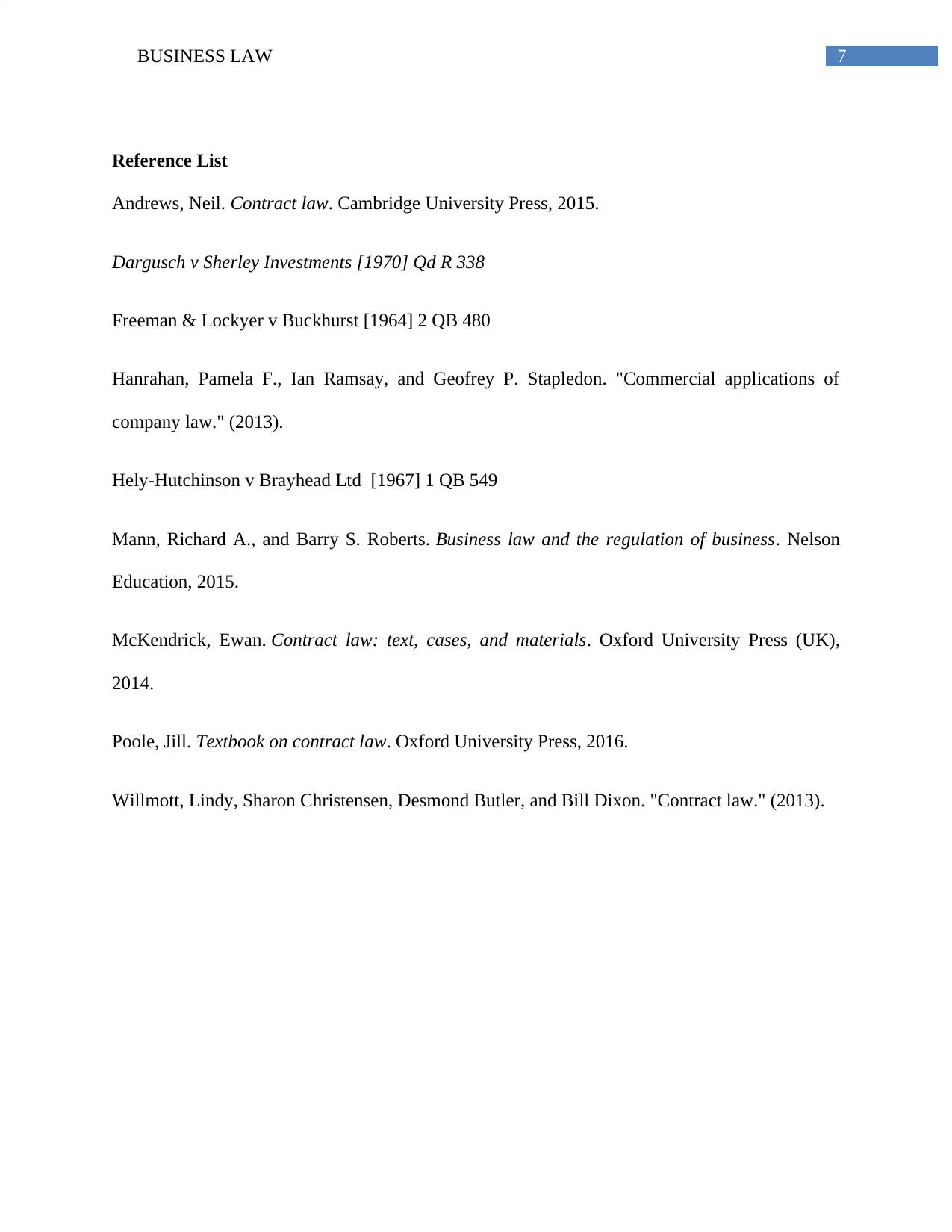
7BUSINESS LAW
Reference List
Andrews, Neil. Contract law. Cambridge University Press, 2015.
Dargusch v Sherley Investments [1970] Qd R 338
Freeman & Lockyer v Buckhurst [1964] 2 QB 480
Hanrahan, Pamela F., Ian Ramsay, and Geofrey P. Stapledon. "Commercial applications of
company law." (2013).
Hely-Hutchinson v Brayhead Ltd [1967] 1 QB 549
Mann, Richard A., and Barry S. Roberts. Business law and the regulation of business. Nelson
Education, 2015.
McKendrick, Ewan. Contract law: text, cases, and materials. Oxford University Press (UK),
2014.
Poole, Jill. Textbook on contract law. Oxford University Press, 2016.
Willmott, Lindy, Sharon Christensen, Desmond Butler, and Bill Dixon. "Contract law." (2013).
Reference List
Andrews, Neil. Contract law. Cambridge University Press, 2015.
Dargusch v Sherley Investments [1970] Qd R 338
Freeman & Lockyer v Buckhurst [1964] 2 QB 480
Hanrahan, Pamela F., Ian Ramsay, and Geofrey P. Stapledon. "Commercial applications of
company law." (2013).
Hely-Hutchinson v Brayhead Ltd [1967] 1 QB 549
Mann, Richard A., and Barry S. Roberts. Business law and the regulation of business. Nelson
Education, 2015.
McKendrick, Ewan. Contract law: text, cases, and materials. Oxford University Press (UK),
2014.
Poole, Jill. Textbook on contract law. Oxford University Press, 2016.
Willmott, Lindy, Sharon Christensen, Desmond Butler, and Bill Dixon. "Contract law." (2013).
1 out of 8
Related Documents
Your All-in-One AI-Powered Toolkit for Academic Success.
+13062052269
info@desklib.com
Available 24*7 on WhatsApp / Email
![[object Object]](/_next/static/media/star-bottom.7253800d.svg)
Unlock your academic potential
Copyright © 2020–2026 A2Z Services. All Rights Reserved. Developed and managed by ZUCOL.





